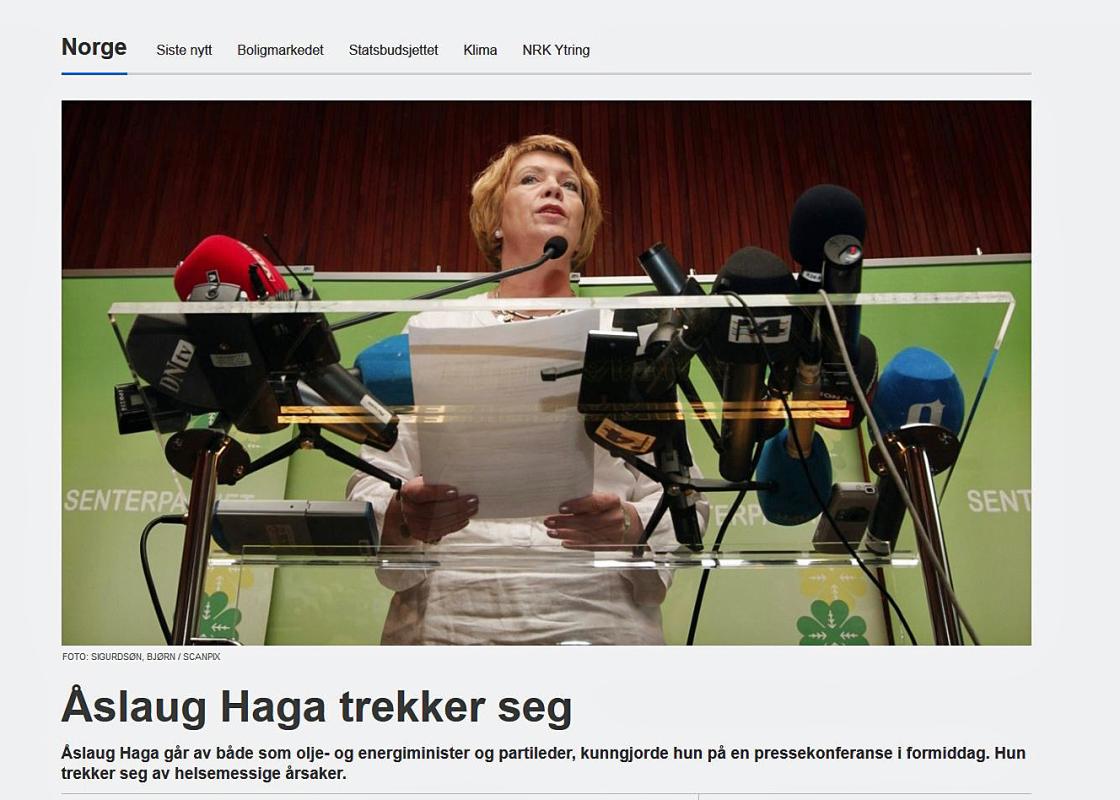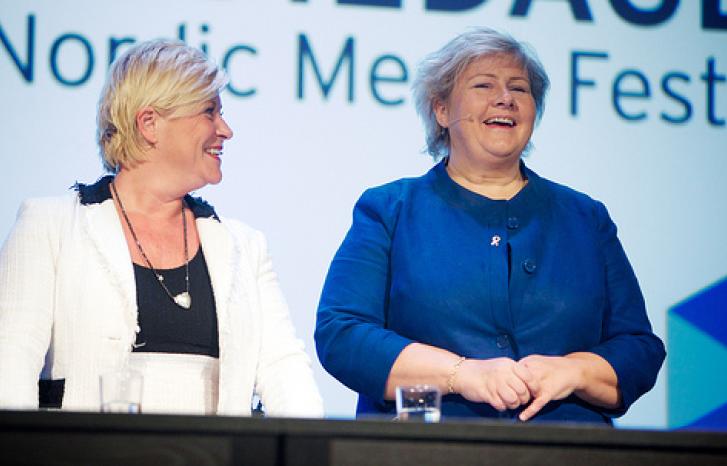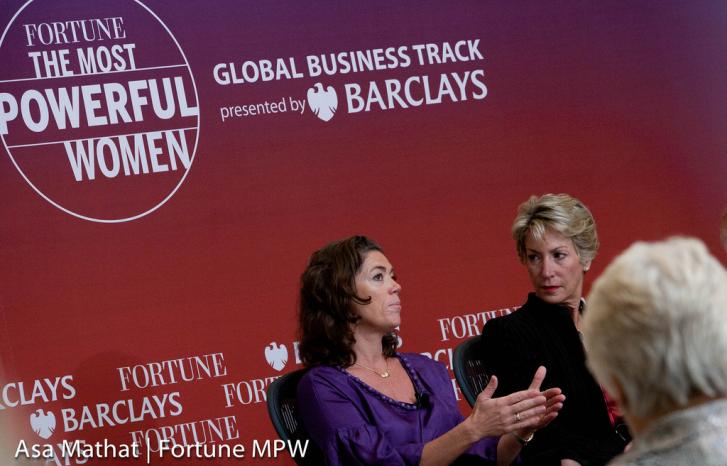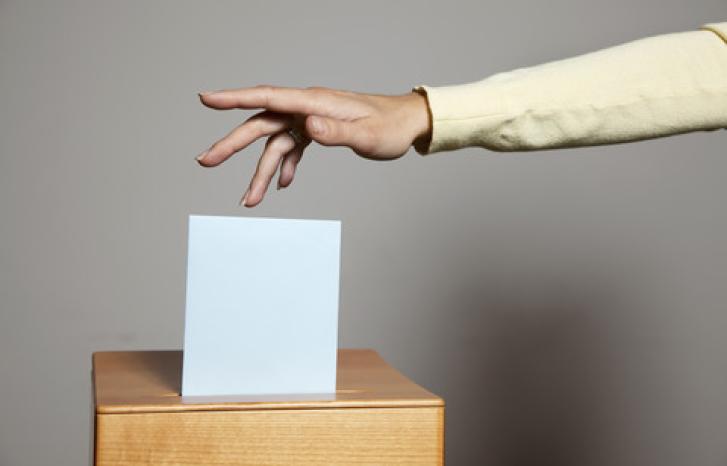An official journey on a too expensive hotel. A storehouse and a pier. A golden bracelet. Alcoholism. Did she give the wrong information in her tax return form by mistake, or did she cheat? An unpaid TV licence bill and the use of black labour. A bullying accusation.
For her doctoral thesis, Elin Strand Hornnes interviewed eight Norwegian female top politicians who have been exposed to massive criticism and media attention. Five of them chose to resign due to the extensive media coverage. But they didn’t apologise.
“In some cases they don’t think they’ve done anything wrong. Others think it is ok that the case was covered, but at the end it is so blown out of proportions, and they don’t understand what to apologise for anymore,” says Hornnes.
Her thesis is entitled Når kvinner må si unnskyld… : medierte skandaler, kvinnelige politikere og retoriske forsvarsstrategier (When women must apologise...: mediated scandals, female politicians, and rhetorical defence strategies).
Researchers have previously claimed that women apologise more easily than men do, and that people to a larger extent expect women to apologise.
But Gerd-Liv Valla doesn’t think she did anything wrong. She wasn’t bullying Ingunn Yssen. According to Åslaug Haga, the media coverage of how her pier was extended without having applied for permission was important; as was the case about etting out her storehouse without having all the paperwork sorted out. But it is difficult to apologise for these things when they are presented more or less as treason.
“Admitting mistakes is the same as accepting your role as the villain. It involves taking responsibility for an extreme representation of yourself and admitting that what you’ve done is almost unforgivable. An apology after a huge media scandal means admitting the whole package.”
Protecting the children
Eventually, five of Hornnes’ interviewees nevertheless resigned: Åslaug Haga and Gerd-Liv Valla in Norway, Ritt Bjerregaard in Denmark, and Gudrun Schyman and Cecilia Stegö Chilò in Sweden.
Karen Ellemann from Denmark, Wanja Lundby-Wedin from Sweden and Magnhild Meltveit Kleppa from Norway remained in their positions.
This corresponds well with the figures from a study of political scandals in the Nordic countries from 1980 to 2009. According to this study, women are not involved in political scandals more often than men are. However, if they are in Government, they are more often forced to resign. 61 per cent of the female government ministers in the study resigned compared to 35 per cent of the male government ministers.
According to a Swedish PhD from 2012 which examined news articles from 1997-2009, male politicians were involved in more scandals than female politicians. But the media wrote more about scandals involving female politicians. Moreover, female politicians were more often required to resign.
Hornnes also sought to interview four men, but they declined. Thus, she has not studied gender differences in the media scandals. Rather, she has asked the eight women why they think more women than men resign.
Most of them emphasise family considerations. According to Haga, women are more aware of what they are putting their children and elderly parents through. Stegö Chilò thinks female politicians are more sensitive to what happens to the children.
Ellemann is aware that her description is gender sterotypical, but she believes that to many female top politicians it is more important to protect the family. Consequently, they chose to resign.
“I don’t know whether or not there is a gender difference here. But I do know that many of my interviewees emphasised family considerations, and talked particularly about ʻmy children’”, says Hornnes.

Bjerregaard, who didn’t have any children, thought that was a strength, since she didn’t have anyone she needed to protect.
Gudrun Schyman, on the other hand, never thought of her children as an obstacle. But she did feel the need to organise the communication with her closest family in order to provide them with correct information whenever new media headings appeared.
Battling the press alone
Another important reason for the female politicians to resign was the lack of a proper support network. They felt that they were battling the press alone.
“There’s nobody there to tell them that this isn’t such a big deal or that it needn’t have serious consequences. According to Åslaug Haga, she felt like a complete scandal, and she had nobody around her to put things in the right perspective,” says Hornnes.
“Haga felt that she was a burden to the entire Government. She had gone from being one of its initiators to an enormous burden. It was tough.”
According to the female politicians, the lack of a support network has to do with several things. Firstly, there is the power perspective. They’re not one of the guys, they’re not part of the tradition with male politician networks, and they don’t back each other up.
Secondly, when the media witch-hunt begins, people are afraid to be caught in the undertow. It is risky to defend a falling politician.
Finally, some of the informants gave examples of supporters who didn’t get through in the media.
“A media witch hunt is characterised by a massive media coverage where all the medias represent the same view and a predetermined perception of who is the villain and who is the victim. Alternative views are easily ignored,” says Hornnes, referring to Gerd-Liv Valla among others.
According to Valla, her supporters were interviewed by the media, but their views were not taken into consideration.
Hornnes’ informants also speculate whether female politicians don’t think their political position is as important as male politicians do. Hence, they more easily conclude that it isn’t worth it – which is strengthened by the fact that the family is affected.
Stegö Chilò regards women as survivalists who may just as well sell hot dogs than work as a Government minister.
See also: Media images of women are getting worse
Reluctant to draw the gender card
According to several of the top politicians in Hornnes’ study, gender was a significant factor for how the media covered political scandals. Gudrun Schyman thought that being both a woman and an alcoholic was a twofold flaw. Gerd-Liv Valla referred to all the caricatures of her and Prime Minister at the time Jens Stoltenberg:
“The newspapers were filled with caricature drawings of Jens clinging to my breast; in one of them I had one of those retractable toy things in his back, in another he was depicted as a poodle. He was placed behind a woman who wasn’t even the Prime Minister. Such representations may make it more difficult to accept women with power, and it provides a breeding ground for new attacks”
Wanja Lundby-Wedin was criticised for bringing her husband along on an official journey. According to her, a case like this would not have received the same amount of media attention if a man had done the same thing. In another case, where she as a board member of the AMF Pension approved of the payment of large bonuses, she was depicted as a novice who didn’t have a clue what she was doing.
Nevertheless, several of the interviewees didn’t think gender had anything to do with their particular case.
“These women have been involved in politics for a long time. They are afraid of maintaining gender stereotypes by saying that they are treated differently because they are female politicians,” says Hornnes.
“Moreover, they may easily be criticised for drawing the gender card. They don’t want to contribute to being reduced to mere gender. It is easier to say that there is a general tendency that women are treated more harshly, than saying that this applies for their particular case.”

Bloodthirsty piranhas, not watch-dogs
The sociologists Lazarsfeld and Merton wrote in 1964 that media exposures are sometimes organised as mere crusades. However, the media scandals did not explode in Scandinavia until the 1980s.
During the first decade of the 2000s, Scandinavian media covered thrice as many political scandals as they did in the 1980s and 1990s.
The scandals often revolves around financial infringements, which involves small amounts on an international scale. The scandal grows if the infringements violate the involved person’s political views. This was the case when Gudrun Schyman from the Swedish Left Party (Vänsterpartiet) was accused of evading taxes.
According to media researchers, the political scandals follow a fixed dramaturgy in the media. They are played in several acts, and the involved parts are given roles such as the villain, the hero, the witch, and the victim. And all medias are chasing the same story. According to Hornnes, they have gone from being watchdogs to becoming bloodthirsty piranhas.
“Is it really that bad?”
“Not all journalists who investigate people of power are piranhas, of course. However, when you are part of a flock chasing one single politician, and you are attacking her or him on the personal level, you do not function as a watch-dog in society,” says the media researcher.
According to Hornnes, the media scandals are mostly not a result of journalistic investigation, particularly not when they revolve around one person. Rather, research shows that political opponents contact the media and use the scandal as an instrument of power.
“The women in my interviews describe how the media coverage becomes extreme. However, they can’t blame one particular journalist or editorial office. It is impossible to place the responsibility anywhere, as there isn’t one specific leader of the flock. Alternative interpretations of the case disappear in the witch hunt.”
Trained in scandals
According to Hornnes, political scandals are part of democracy. It is the media’s job to investigate and throw light on the people who have been elected to represent us.
But the less serious breaches seem to become huge scandals. And media research has shown that the politicians’ personal qualities and private lives are becoming an increasingly more important part of the story. The politics they represent is less important.
Hornnes’ informants emphasised the importance of a free, scrutinising press, and they believe that journalists want to do a good job.
But the media pressure they describe is impossible to endure. They get high blood pressure, and their children have to crawl on the floor in order not to be caught by the camera lenses of the journalists who are hiding in the garden. They invade the private sphere and become a health risk.
Two of the politicians who didn’t resign were the clearest in their concern that political scandals in the media may represent a democratic problem.
Wanja Lundby-Wedin worried about what she calls the resigning power of the media, while Karen Ellemann’s concern was that people will cease to become involved in party politics due to the media witch hunts and the personal focus.
Hornnes shares their concerns. In the concluding remarks of her PhD thesis, she sketches a thoroughly trained caricature of a politician who is born and raised within the political party.
“Those who are trained within the party and knows how to respond to criticism without really answering anything, they are the ones who might endure this type of media pressure. Those who completely adapt to the media logics. Alternatively, those who try to be invisible. Already there is a tendency that those who are thoroughly trained survive the scandals,” Hornnes concludes.
Translated by Cathinka Dahl Hambro.
Gerd-Liv Valla, resigned as leader of the Norwegian Confederation of Trade Unions (LO) after being accused of bullying and harassing her pregnant employee Ingunn Yssen.
Åslaug Haga, resigned as leader of The Centre Party (Senterpartiet) and as Minister of Petroleum and Energy in 2008 following a case where her husband had made an extension to their pier and rented out a storehouse without permission from Ås Municipality.
Gudrun Schyman, resigned as leader of the Swedish Left Party (Vänsterpartiet) in 2007. This was not due to the prolonged scandals related to her alcoholism, but to tax evasion.
Ritt Bjerregaard, resigned as Minister of Education in Denmark in 1978 as a result of an expensive trip to Paris. Furthermore, she resigned as parliamentary group leader of the Social Democrats (Socialdemokraterne) in 1991 in connection to the purchase of an apartment.
Cecilia Stegö Chilò, was appointed Minister for Culture in Sweden in 2006, but withdrew ten days later following the exposure of her having employed babysitters during the 1990s without paying the appropriate taxes. Moreover, it was revealed that she hadn’t paid the TV licence in 16 years.
Stegö Chilò was part of the so-called Minister Affair (Ministeraffären) in Sweden, where Minister of Commerce Maria Borelius also had to resign while Minister of Migration Tobias Billström and Minister of Finance Anders Borg remained.
Magnhild Meltveit Kleppa, remained as Minister of Transport and Communication from the Centre Party (Senterpartiet) after having accepted as a gift a golden bracelet without reporting it to the tax authorities.
Wanja Lundby-Wedin, continued as leader of the Swedish Trade Union Confederation (LO) after having approved of large bonuses in connection to a board appointment.
Karen Ellemann, remained as Minister of Environment in Denmark following a case where journalists went through her refuse while claiming that she didn’t follow her own politics and didn’t recycle her rubbish according to their source material.



